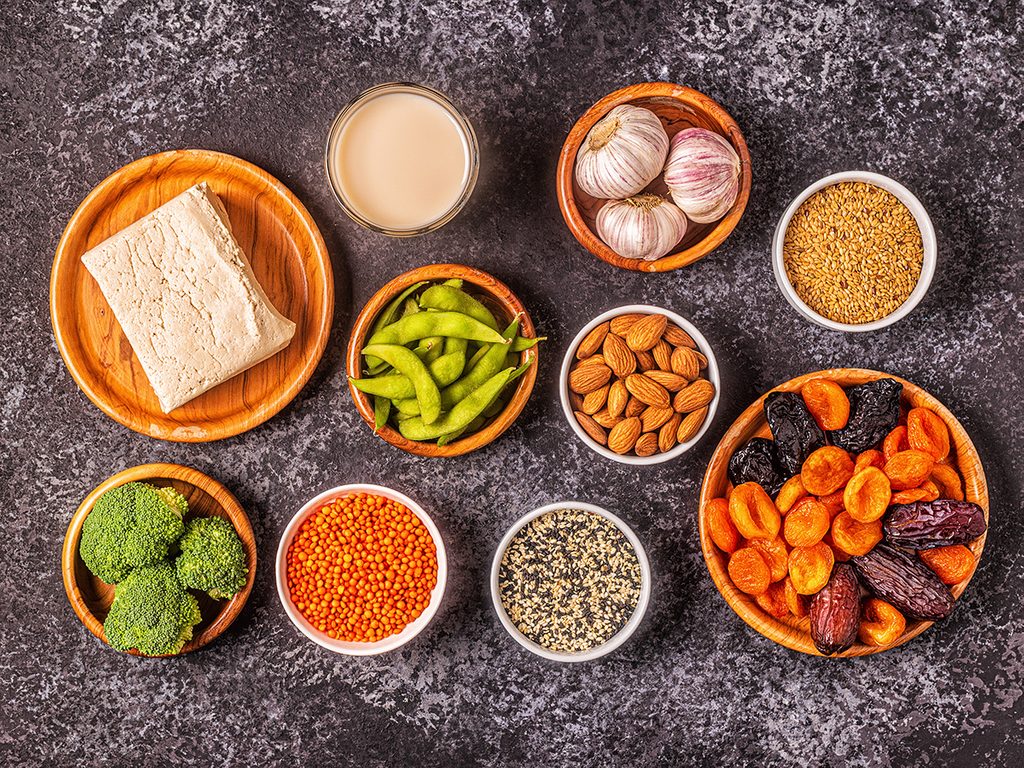5 Changes to Your Diet to Help Ease Perimenopause and Menopause Symptoms

Little changes to your diet can help you avoid feeling hot and bloated during this wild time.
Menopause and perimenopause can cause a dramatic shift in how women feel, think and relate to their bodies. Making some lifestyle changes in your late 30s and early 40s that support this life-changing process can go a long way to making it a bearable (even enjoyable!) transition.
First, the basics: “Menopause” refers to the first full year after a woman stops her menstrual period. It’s caused by hormonal changes in which the ovaries produce less estrogen and progesterone, the two main reproductive hormones. This reduction in estrogen causes periods to become more irregular, both in timing and flow.
The average age for menopause remains around 51 years old, however it can vary greatly, depending on many factors. The super-fun perimenopausal period, where a lot of the hormonal ups and downs take place, can last for 10 years.
The symptoms involved in both phases are highly varied for women depending on lifestyle, genetics, medications and other medical conditions. Some of the most common symptoms are:
- Abdominal fat gain and general weight gain
- Sleep interruption; difficulty falling and staying asleep
- Mood swings; increased or unpredictable irritability, sadness and anger
- Hot flashes or temperature intolerance
- Constipation, reflux and bloating
The good news: You do not have to sign-up to feel hot, angry and bloated for 10 years! Here are some of the most effective dietary strategies that can help manage symptoms:
1. Meet your fibre goal daily
Most women do not get enough fibre daily, which is a problem, because it’s an amazing source of energy for your gut bacteria. Your microbiome (a.k.a. your gut bacteria) thrive on a diet high in undigestible fibres from whole vegetables and fruit (with the skin), whole grains, legumes and fermented foods. Women need about 30 to 35 grams of total fibre daily, this can be from a mixture of foods (try steel-cut oats, barley, apples, blueberries, broccoli, chickpeas, and black beans as regular options.) As an example, a medium-sized whole apple typically contains four to five grams of fibre, and one cup of black beans has 15 grams of fibre.
2. Eat lower glycemic index foods
Insulin is a hormone made in the body that is released when we eat, to help transport blood sugar to in muscle and brain cells. Too much insulin production has been linked to many inflammatory diseases and can aggravate fat accumulation around the abdomen, which wreaks havoc with hormones and can aggravate symptoms of menopause. Foods that turn to sugar quickly in the bloodstream are considered high on the glycemic index (e.g. white sugar, white rice, white potatoes, many processed foods and sweetened treats) causing more insulin to be released. Legumes, whole grains such as barley, rye and oats, lower sugar fruits, any non-starchy vegetables are lower glycemic options. Look at the International Glycemic Index Tables by Jenny Brand-Miller for a full list.
3. Give whole soy and tofu a try
Whole soy foods, such as edamame (soy) beans fresh or frozen, plain tofu or unsweetened fortified soy milk can help ease symptoms of hot flashes thanks to presence of whole isoflavones. These are phytochemicals that may help balance hormonal fluctuations associated with menopause. Aim for 25 grams of whole soy protein a day, from foods such as plain tofu and edamame (not supplements). Eating these foods regularly is also a great way to get protein, calcium and fibre at the same time.
4. Hydrate hydrate hydrate
Dehydration can have a huge effect on symptoms: Even a two- to three-percent change can cause cognitive difficulties and affect decision-making. Digestive issues such as constipation and reflux can also worsen without adequate hydration. And take note: dehydration can be mistaken for hunger cues which can lead to snacking or eating larger portion sizes. Aim to have at minimum two litres of hydrating fluid daily.
5. Reduce or eliminate alcohol and caffeine
This can be one of the more challenging aspects of improving peri and menopausal symptoms. Habits such as a regular nightly glass of wine to relax or coffee later in the day to boost your energy, can begin to drastically impact sleep and mood during this stage. Alcohol is a depressant and can cause dehydration. It can lead to overeating and aggravate symptoms of anxiety and depression. Alcohol and caffeine can interrupt deep REM sleep-cycles, even if consumed hours before sleep, which compounds the hormonal disruption of sleep in menopause. Aim to have alcohol less often or not at all. Limit caffeine to before 11 a.m.
The trick with all of these changes is to be as consistent as possible, and to compliment them with other healthy behaviours like getting regular exercise (especially weight-bearing exercise). And remember, you’re not alone— talking about symptoms with your doctor and your friends and family can be a huge help. It’s a wild time, so having some support systems in place can go a long, long way.
Nishta Saxena is a Registered Dietician and nutrition educator based in Toronto.
Next: 9 Questions About Menopause You’ve Been too Embarrassed to Ask




